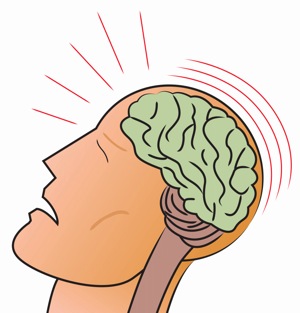
Brain injury prevention goes beyond whether you wear a helmet. Two people with the same injury can have two wildly different reactions—one mild, one debilitating—based on the health of their brain prior to injury.
If your Hashimoto’s hypothyroidism condition is not properly managed, you may be at risk for more devastation from a brain injury. Hashimoto’s is an autoimmune disease and managing the immune condition is important to protect your brain.
Although we can't necessarily control whether a brain injury happens from a fall, a car accident, or a blow to the head, we can affect how well our brain copes with the trauma. More than 1.7 million people sustain a brain injury each year, and more than 5 million people are disabled due to brain injuries.
Your brain health determines your response to a brain injury
The brain is an extremely malleable organ that is constantly being shaped by our environment, diet, experiences, thoughts, and emotions. Because it is such a sensitive organ, brain health can easily suffer.
What makes the brain most vulnerable to increased devastation from a brain injury is inflammation. Inflammation in a knee, ankle, or elsewhere in the body typically results in pain. An inflamed brain, however, does not hurt. Instead, a common symptom of brain inflammation is brain fog. People with brain fog complain their thinking feels slow and disconnected, as if they are in a fog. This is because the inflammation in the brain slows communication between neurons.
People with Hashimoto’s hypothyroidism often complain of brain fog and may suffer from brain inflammation. Sufficient thyroid activity is necessary to keep brain inflammation under control, making the person with hypothyroidism more prone to brain inflammation.
Other symptoms of brain inflammation can include memory loss, depression, anxiety, and neurological disorders.
What causes brain inflammation when you have Hashimoto’s hypothyroidism
The factors that cause brain inflammation are often the same factors that cause inflammation elsewhere in the body, and stem primarily from poor diet and lifestyle choices. One of the more common causes of brain inflammation is inflammation in the gut. If you have any digestive disorders—stomach pain, constipation, diarrhea, heartburn, gas, bloating, multiple food sensitivities—you may be at risk of brain inflammation.
These factors also make it difficult to manage Hashimoto’s hypothyroidism and should be addressed for good thyroid function, too.
The effects of the brain injury will be much worse and more difficult to heal if inflammation is already a problem.
Common factors that inflame the brain include:
- Food intolerances, particularly to gluten. The brain has been found to be the tissue most often affected by a gluten sensitivity.
- A diet high in sugar
- Blood sugar imbalances (low blood sugar, high blood sugar, or diabetes)
- Leaky gut (a damaged gut wall that allows undigested food, bacteria, and other pathogens into the bloodstream)
- Unmanaged autoimmune disease, such as Hashimoto's hypothyroidism
- Chronic inflammation elsewhere in the body
- Hormonal imbalances: Hormones play an important role in brain health. For instance, an estrogen deficiency in a woman can cause brain inflammation and make the brain significantly more vulnerable to damage from a brain injury. Also, progesterone has been shown to be very therapeutic after a brain injury.
- Poor blood flow and oxygenation. The brain cannot function well without a good flow of blood, which carries oxygen. Factors that can hamper this include anemia, smoking, poor circulation, blood sugar imbalances, chronic stress, and high or low blood pressure.
Symptoms that indicate you may be at risk for more devastation from a brain injury
By knowing what symptoms to look for, you can take action to improve your chance of a good outcome in the event of a brain injury.
Certain symptoms show your brain may be inflamed or in poor health. As mentioned earlier, digestive symptoms or hormonal imbalances can inflame the brain. Multiple chemical sensitivities indicate you have lost a tolerance to environmental compounds and your antioxidant status is low, making your brain more vulnerable. Chronic depression has been linked to chronic gut and brain inflammation. Anxiety or mood disorders signal imbalances in brain health. Memory loss and poor cognition also signal brain health is deteriorating.
If you have Hashimoto’s hypothyroidism but are not managing the underlying autoimmune condition, you may suffer from brain inflammation and be at risk for increased devastation from a brain injury.
Supporting brain health
The factors that support brain health are the same factors that support your body's health. They include a whole foods diet rich in antioxidants and omega 3 fats, sufficient vitamin D, regular physical activity and enough sleep, healthy social activity, and avoiding foods and lifestyle factors that increase stress and inflammation. For the person with Hashimoto’s hypothyroidism, a strict gluten-free diet is also essential. You may also need to follow the autoimmune diet.
Contact our office here in Charlotte, NC for more information or to book an appointment with one of our natural medical practitioners : (704) 308-2557







Comments on this entry are closed.
Thank you for the article! The time that you’ve taken to write this out could potentially help quite a few people; thanks again!